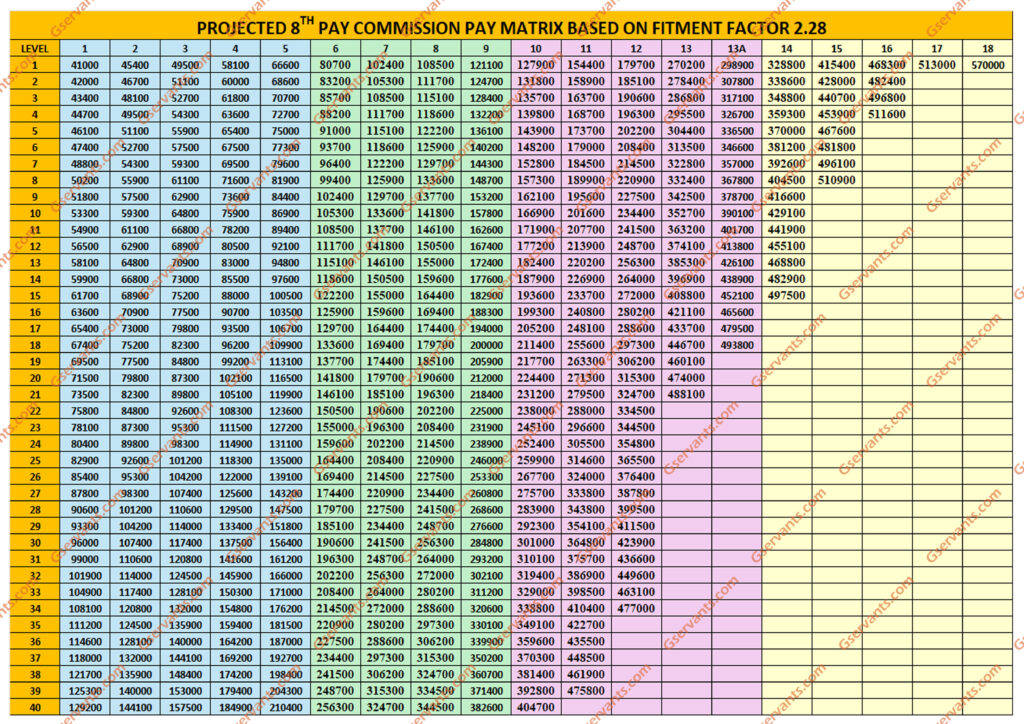The 8th Pay Commission, which is yet to be established, must adhere to the Pay Matrix Table developed by the seventh pay commission when it comes to revising Pay Scales and Allowances.
Therefore, the forthcoming Pay Matrix Table of the 8th Pay Commission will be formulated using the same principles that were employed in the development of the Pay Matrix by the 7th Pay Commission
The origin of Pay Matrix Table
The 7th Pay Commission evolved a Pay Matrix in a single page tabular format that includes all the Pay Scale and annual increments of 40 lakh Central Government Employees. It is so simple and convenient to fix the Pay on account of Promotion or calculate, check the Basic pay at any stage without any arithmetic calculation.
Hence forth coming pay commission will have no options than just modifying the Pay matrix table for revision pay.
Projected 8th Pay Commission Pay Matrix Table
Now the 8th Pay Commission, yet to be constituted, has to follow the methods of seventh pay commission in respect of revising Pay Scales in Pay matrix format.
Already we have assumed that the Fitment Factor might be 2.28 in 8th Pay Commission Read this the report
Accordingly the the cells in all Levels in Pay matrix will be multiplied by 2.28 to arrive Pay matrix for 8th pay Commission. If the 8th Pay Commission decides to go with Pay matrix format for Pay Revision, it will not need much calculation/process for evolving a new format for Pay Scales.
7th Pay Commission pay Matrix and its uniqueness
7th pay commission wanted to simplify the procedure for fixing the pay for Central Government Employees without any calculation. So the Commission had evolved a tabular column with Levels and cells and named it as Pay Matrix
How Pay Matrix Replaced Sixth CPC Pay Structure
At the time of constitution of the VI CPC there were about 35 standard pay scales in existence. Many of these pre revised scales were merged by the VI CPC to arrive at 19 grades spread across four distinct Pay bands along with 4 distinct scales including one Apex scale (fixed) for Secretary/equivalent and one scale for Cabinet Secretary/equivalent (fixed). The concept of Grade pay was intended as a fitment benefit but it also served as a level determiner within a pay band.
Following implementation of the VI CPC recommendations, the pay structure in the Civilian set up consists of four pay bands with 15 levels of grade pay, along with four standalone scales viz., the HAG scale, HAG+ scale, Apex scale (fixed) and the scale of Cabinet Secretary (fixed) as shown below in Table
The sixth CPC pay Scale
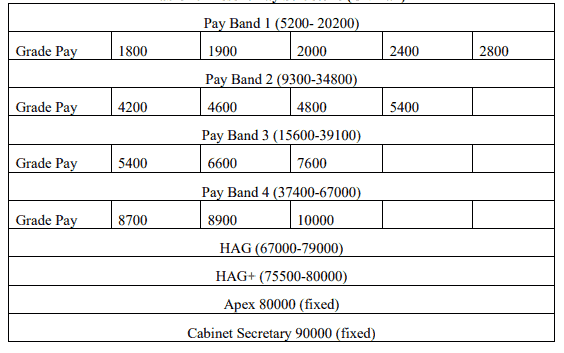
The basics of Pay Matrix
The Commission has designed the new pay matrix keeping in view the vast opportunities that have opened up outside government over the last three decades, generating greater competition for human resources and the need to attract and retain the best available talent in government services. The nomenclature being used in the new pay matrix assigns levels in place of erstwhile grade pay
Prior to VI CPC, there were Pay Scales. The VI CPC had recommended running Pay Bands with Grade Pay as status determiner. The Seventh CPC is recommending a Pay matrix with distinct Pay Levels. The Level would henceforth be the status determiner.
Index of Rationalisation IOR used to differentiate Pay bands
Since the existing pay bands cover specific groups of employees such as PB-1 for Group `C’ employees, PB-2 for Group `B’ employees and PB-3 onwards for Group `A’ employees, any promotion from one pay band to another is akin to movement from one group to the other. These are significant jumps in the career hierarchy in the Government of India. Rationalisation has been done to ensure that the quantum of jump, in financial terms, between these pay bands is reasonable.
This has been achieved by applying ‘index of rationalisation’ from PB-2 onwards on the premise that with enhancement of levels from Pay Band 1 to 2, 2 to 3 and onwards, the role, responsibility and accountability increases at each step in the hierarchy. The proposed pay structure reflects the same principle. Hence, the existing entry pay at each level corresponding to successive grades pay in each pay band, from PB-2 onwards, has been enhanced by an ‘index of rationalisation’ as shown below in Table
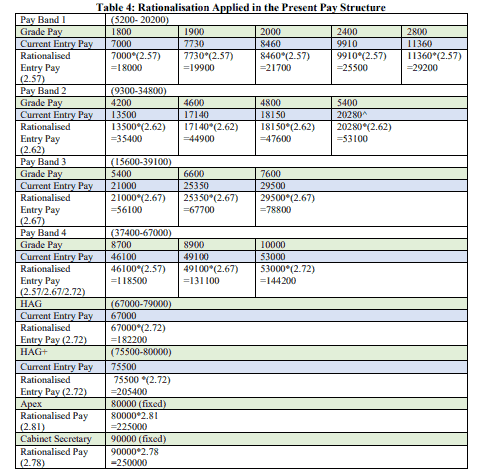
Projected 8th Pay Commission Pay Matrix
The Basics for computing the Projected 8th Pay Commission Pay Matrix is mainly depends on Minimum Pay Increase and Fitment factor
Know Your 8th CPC Pay-Projected 8th pay Commission Pay calculator
We have already posted two articles regarding calculation of 8th CPC Minimum Pay [ Read Expected 8th CPC Minimum Pay calculation] and Fitment Factor [ Read what will be the Fitment factor in 8th CPC]
The above calculations indicate that the 8th CPC Minimum Pay is set at Rs.41000 and the Fitment Factor stands at 2.28. This information leads to the expected Pay Matrix in the 8th Pay Commission provided below
Since Rationalization of pay as per the classification of Posts has been achieved in 7th CPC, there is no need to use different Fitment factor for the various Levels in 8th CPC
Projected 8th Pay Matrix Table for Level 1 to 5
The Levels 1 to 5 in Pay Matrix which represents erstwhile Grade pay in PB I are arrived by using UMF (Uniform Multiplying factor) 2.28
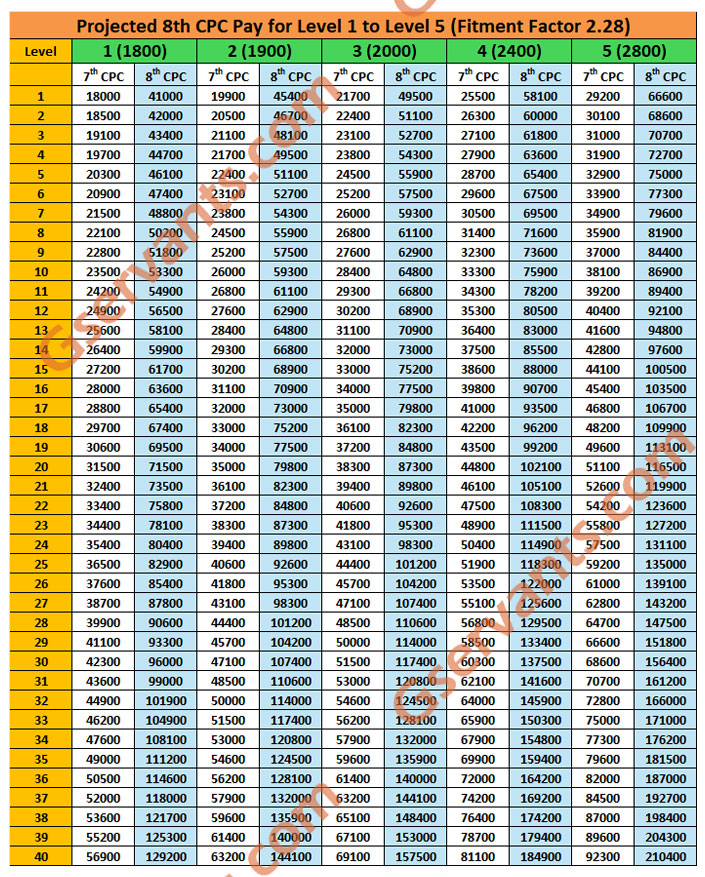
Projected 8th Pay Matrix Table for Level 6 to 9
The pay matrix table for Levels 6 to 9 which replaced the Grade pay in PB II are arrived by using Fitment factor (UMF) 2.28. See the table below
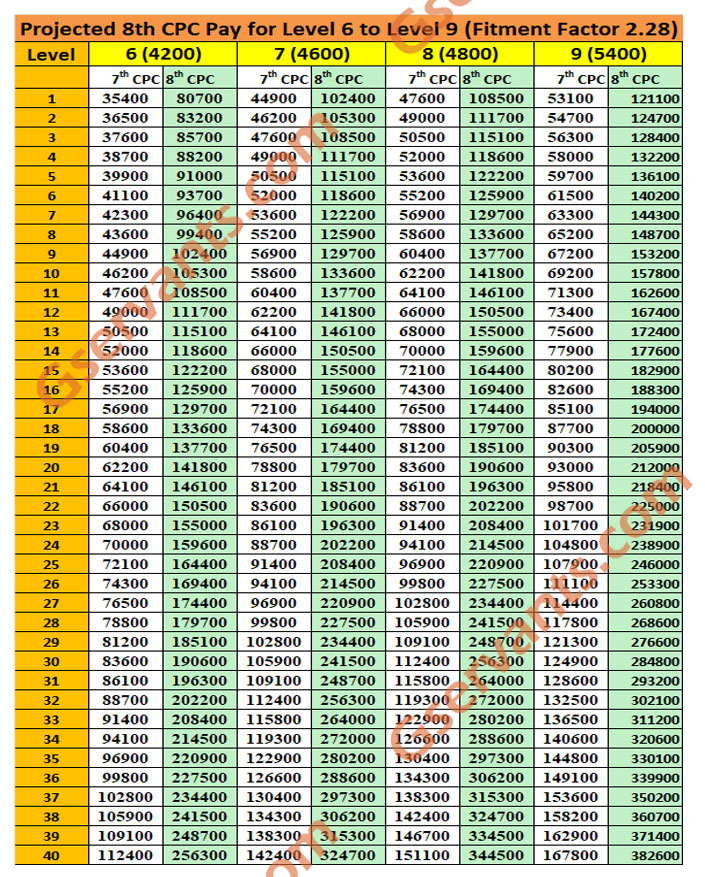
8th Pay Commission Pay Matrix Table for Level 10 to 13A
The Levels from 10 to 13A in Pay Matrix are arrived by using UMF 2.28
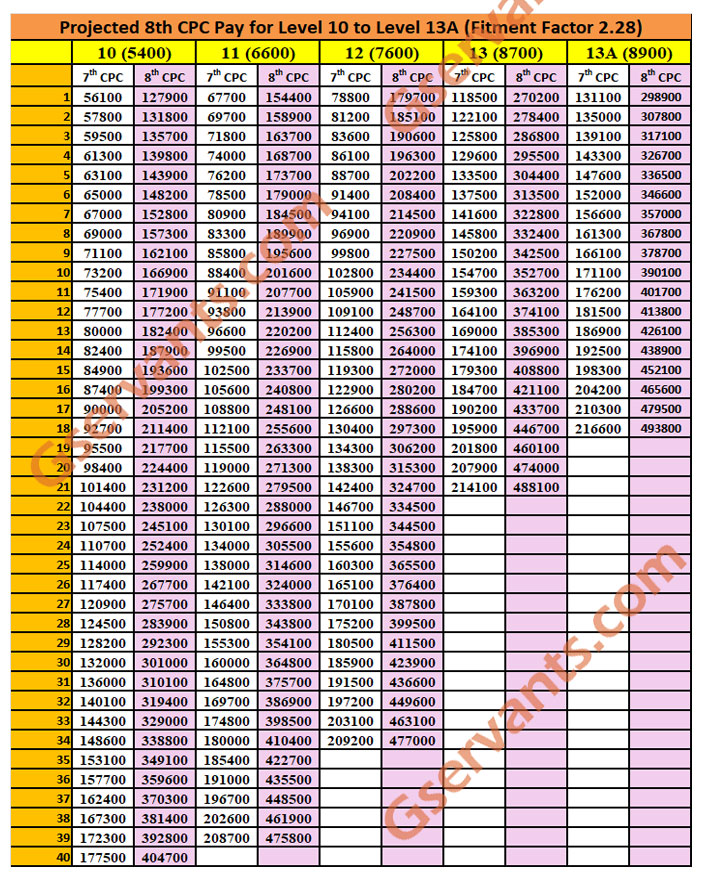
Projected 8th CPC Pay Matrix for Level 14 to Level 18
The Pay Matrix for Level 14 to 18 are calculated by UMF 2.28
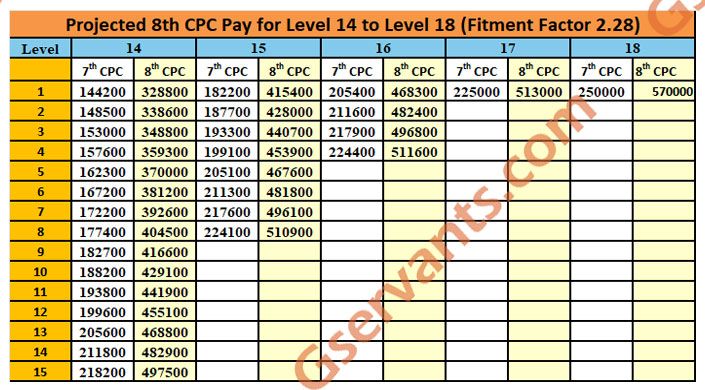
Projected 8th Pay Commission Pay Matrix for All Levels
All Levels in Pay Matrix from 1 to 18 are done with Uniform Multiplying factor 2.28 only
In the newly evolved pay matrix for 7th CPC regime, there are 19 levels framed to replace the 19 Grades in Sixth CPC.
Since the this Pay matrix table is user friendly, we expect that 8th Pay Commission will just adopt this for format for pay revision
